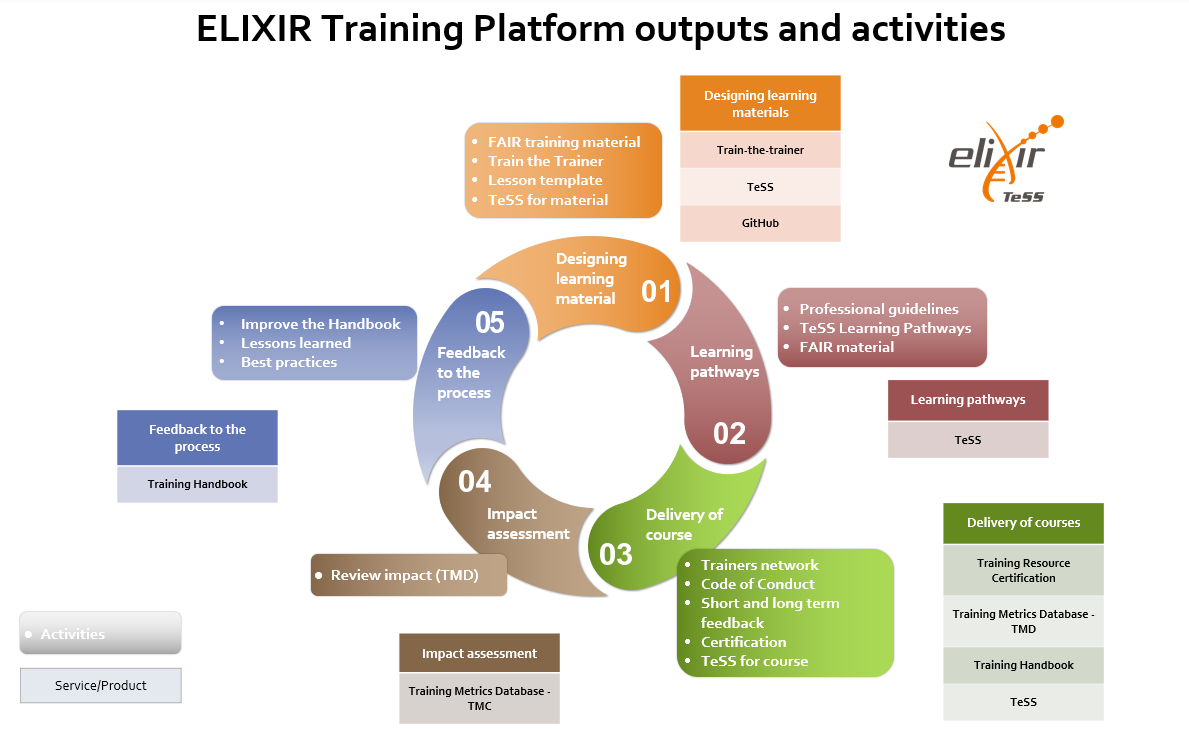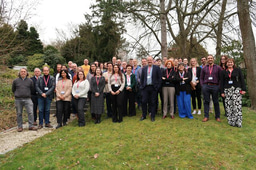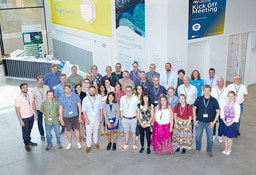How to make use of the ELIXIR Training Platform and its resources

This post has been co-authored by Eva Alloza (ELIXIR Spain), Katharina Heil (Platform Coordinator, ELIXIR Hub), Jessica Lindvall (ELIXIR Sweden), and Fotis Psomopoulos (ELIXIR Greece), all part of the ELIXIR Training Platform Coordination Team.
ELIXIR is a pan-European Research Infrastructure within the ESFRI (European Strategy Forum on Research Infrastructures) that aims to provide a network or ‘infrastructure’ to help coordinate European resources for those working with life science data: databases, software tools, resources for interoperability, resources for training, cloud storage, and supercomputers. Its current scientific programme can be found here.
ELIXIR has 23 members – these are countries and referred to as ELIXIR Nodes. Each Node represents the research institutes that belong to ELIXIR within each member country; they are responsible for providing services at a national and local level. In addition, to meet its cross-national objectives, ELIXIR brings together experts from the different Nodes, forming Platforms, Communities, or Focus Groups.
Training people and developing capacity to work with life science data is a key scientific objective of ELIXIR and it is organised and delivered through its Training Platform. Watch an overview video:
The Training Platform was established to develop a training community that spans all ELIXIR Nodes (countries), and brings together over 220 research organisations. The delivery of training is done at the ELIXIR Node level by leveraging the Training Platform resources and services, as well as connecting to the ELIXIR community of trainers and experts. These efforts also connect ELIXIR Platforms, Communities, and Focus Groups. In doing so, the Nodes build further capacity in training communities at national level (1, 2).
A Training Coordinator represents each Node within the Platform, forming the Training Coordinators Group (TrCG). Beyond coordinating and leading the implementation of the ELIXIR training strategy across Europe, the TrCGs act as liaisons between a national Node and the wider ELIXIR community. TrCGs represent the contact point for ELIXIR members on a national level.
The Training Platform and its members aim to strengthen national training programmes, grow bioinformatics, data stewardship and Train-the-Trainer training capacity and competence across Europe, and empower researchers to use ELIXIR's services and tools (complete list of over 500 ELIXIR services). Since its inception, the Training Platform strives to build, support and implement best practices in bioinformatics training.
The ELIXIR Training Platform has several successful training products all of which are accessible and made available to everyone, including trainers, trainees, training providers, funders, training developers, and the other ELIXIR Platforms and Communities. The table shows an overview. In addition, the network leverages training products developed and maintained by the individual Nodes.
|
Training Resources |
Definition |
Audience / (End) Users |
|
TeSS (3, 4) |
A platform providing a one-stop shop for trainers and trainees to discover training materials, events and interactive online tutorials (for online and offline use), as well as e-learning resources. |
Trainers and Trainees |
|
ELIXIR-GOBLET Train-the-Trainer programme (5) |
Fostering a network of trainers, the TtT instructor's community facilitates reciprocal support and exchange of experiences. TtT courses give new instructors tools and tips for providing an enriching learning experience to trainees, irrespective of topic, and to include best-practice guidance on course and training material development. |
Trainers |
|
A handbook with practical advice on how to FAIRify training material. Produced jointly by ELIXIR members and the international community. |
Trainers |
|
|
… for making training materials FAIR. A set of rules to be applied to help make training materials easier to find, (re)use, and adapt, for the benefit of all. |
Trainers |
|
|
Training Metrics Database |
A database streamlining data collection, storage, and visualisation for assessing the Quality and Impact of ELIXIR training. Based on the Quality and Impact Framework as described in A framework to assess the quality and impact of bioinformatics training across ELIXIR |
Trainers, training programme managers, policy makers |
|
Training resource certifications |
Creating a set of guidelines as well as a process for certifying training resources (i.e., material and events). |
Trainers and training programme managers |
|
Learning Paths |
Creating sets of routes taken by learners through a range of training activities, which allows them to build knowledge progressively |
Trainers and Trainees |
|
E-Learning (6) |
Creating a set of guidelines as well as a process for e-learning resources (i.e., material). |
Trainers and training programme managers |
|
Training Operational Handbook |
A handbook with guidelines and best practices developed by the ELIXIR Training Platform. |
Trainers and training programme managers |
Table: Overview of the ELIXIR Training Platform training products.
The ELIXIR Training Platform offers services and best practices across the entire Training Life Cycle. Starting from the design of the learning material and the construction of the relevant learning paths, the lifecycle includes the delivery of the actual course and the impact assessment, leading up to the process of the feedback and the improvement of the material (starting the cycle anew). Within this lifecycle, while it is still being further developed, the Training Platform provides a framework (as a set of guidance documents/webpages) of the training services that can be used in combination towards a complete ELIXIR training life cycle.

Ultimately, all these training resources are tailored to the needs of the scientific community across the various career trajectories and disciplines, both delivering and receiving training, to assist them in their daily work. The ELIXIR Communities are groups of experts across ELIXIR Nodes and externally that represent a scientific or technological theme, and drive the development of standards, services, and training in and across ELIXIR. They provide an opportunity to be a part of a wide-reaching network, and also offer a mechanism for long-term collaboration with other ESFRIs and large-scale initiatives.
Learning Paths are an important support for any learner in their professional development trajectory. Today, many disciplines, domains and competencies have designed dedicated training collections and linked learning paths to them as to assist individuals in what “Knowledge, Skills and Abilities (or Behaviours)” areas they need to train themselves in, in order to become proficient or expert in a certain domain. Challenges however do persist in designing such learning paths, both for the use from the Trainer/Instructor perspective as well as from the learner perspective. ELIXIR supports this activity through a dedicated Learning Paths Focus Group. The primary objective of this Focus Group is to foster the exchange of knowledge, ideas, and experiences with the aim of identifying needs, devising solutions, and advocating the widespread adoption of learning paths across ELIXIR, its Nodes, Communities, and beyond. This effort will address the current lack of guidance in developing curricula or structured training programs, with the ultimate goal of enhancing the learning experience for end users.
The ELIXIR Training Platform supports communities both by designing and co-producing FAIR (Findable, Accessible, Interoperable, Reuseable) training material, capacity building in Train-the-Trainer skills in addition to support on the implementation of coherent learning paths across topics of interest, such as the following examples from across the ELIXIR ecosystem:
- Single-cell Omics Community – collection of courses and materials – TeSS (Training eSupport System),
- Plant phenotyping and plant genomic data management, Building-interoperable-and-reusable-systems-biology-models
We encourage the reader to visit the ELIXIR site to find out how the infrastructure can help their work.
References
- Anton M, Benfeitas R, Lindvall JM et al. NBIS Training Report 2020 – 2021 [version 1; not peer reviewed]. F1000Research 2022, 11(ELIXIR):618 (document) (https://doi.org/10.7490/f1000research.1118982.1)
- Wibberg D, Batut B, Belmann P et al. The de.NBI / ELIXIR-DE training platform - Bioinformatics training in Germany and across Europe within ELIXIR [version 2; peer review: 2 approved]. F1000Research 2020, 8(ELIXIR):1877 https://doi.org/10.12688/f1000research.20244.2
- Bacall, F., Apaolaza, A., Andrabi, M., Child, C., Goble, C., Sand, O., & Botzki, A. (2023). Making bioinformatics training events and material more discoverable using TeSS, the ELIXIR training portal. Current Protocols, 3, e682. doi: 10.1002/cpz1.682
- TeSS How can I help you? ELIXIR TeSS (Training eSupport System) Tutorial
- Allegra Via, Teresa K Attwood, Pedro L Fernandes, Sarah L Morgan, Maria Victoria Schneider, Patricia M Palagi, Gabriella Rustici, Rochelle E Tractenberg, A new pan-European Train-the-Trainer programme for bioinformatics: pilot results on feasibility, utility and sustainability of learning, Briefings in Bioinformatics, Volume 20, Issue 2, March 2019, Pages 405–415, https://doi.org/10.1093/bib/bbx112
- Zahn, M., Sand, O., Mishra, A., Wibberg, D., & Botzki, A. (2023). ELIXIR guidelines for curation of e-learning material in TeSS (1.0). Zenodo. https://doi.org/10.5281/zenodo.10278082
Photo by Alain Pham on Unsplash





Join the FEBS Network today
Joining the FEBS Network’s molecular life sciences community enables you to access special content on the site, present your profile, 'follow' contributors, 'comment' on and 'like' content, post your own content, and set up a tailored email digest for updates.